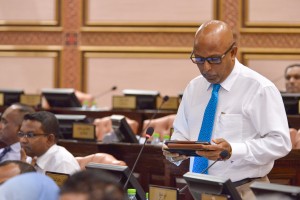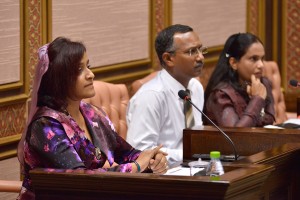Reporting by Ismail Humaam Hamid
The Maldives Road Development Corporation (MRDC) has uprooted three newly planted areca palms in Malé today on the Housing Ministry’s orders.
The opposition dominated Malé City Council (MCC) replanted three trees this morning after masked men – believed to be police officers – chopped down 30 palm trees in the early hours of October 24.
“Today we planted three trees near the Malé City Council. However, workers from MRDC uprooted the trees moments later. They said they were acting on orders from the Housing Ministry,” Malé City Mayor Mohamed Shihab told the press today.
The police refused to help despite repeated requests, but watched the trees being removed, the mayor said.
“We requested assistance from the police as per rights afforded to local councils in the Decentralisation Act. But the police on the scene refused to help us. We have decided to lodge a complaint at the Police Integrity Commission (PIC).”
The MCC will also file a court case against MRDC for its illegal actions, the council said, arguing that the MRDC must defer to the MCC and obtain permission from the council in matters concerning Malé City.
According to newspaper Haveeru, senior members of the ruling Progressive Party of the Maldives (PPM) believe the opposition Maldivian Democratic Party (MDP) use the areca palm trees for black magic to curse President Abdulla Yameen with ill health.
“[They] believe that [President Yameen’s] health worsens with every palm frond that falls off the areca palm trees. And that his health would worsen further with every tree that blossoms,” an anonymous government official was quoted as saying.
The MDP-dominated city council had planted the palm trees – donated by the Indian High Commission – in October 2011 as part of efforts to make the capital greener.
Meanwhile, former President Mohamed Nasheed alleged that masked Special Operations (SO) police officers in plain clothes chopped down the palm trees with machetes.
Patrolling police officers from the Maafanu police station arrested two of the perpetrators, Nasheed told the press last week, claiming that the suspects were handed over to the SO on the orders of a senior official from the SO command.
The pair were taken to the police Iskandhar Koshi barracks in an SO vehicle, he claimed.
Commissioner of Police Hussain Waheed held a press conference last week during which he denied police involvement in the incident, dismissing the opposition leader’s allegations as “baseless”.
Speaking to the press today, Deputy Mayor Shifa Mohamed accused the government of chopping down the areca palms.
“The government is involved in the chopping down of the trees. There were a lot of SO police officers in Malé that night. However, it is unclear whether they were trying to stop the vandalism or assisting in the crime,” she said.
The council said it will lodge a complaint over MRDC’s actions with the Local Government Authority, the Human Rights Commission of the Maldives, and international organisations.
Several areca palm trees were also uprooted during protests against the MDP government in January 2012.

